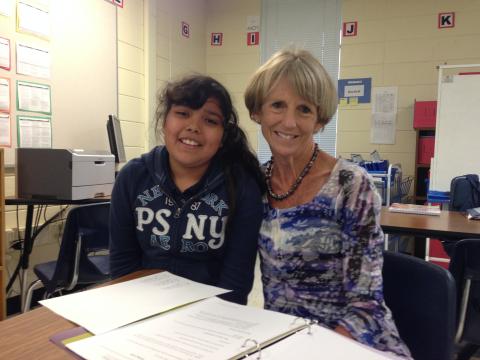Behind the Scenes: Heart Math Tutoring
A note from SHARE: This 2-part guest post from our friends at Heart Math Tutoring is a must read! Part 1 will give you the scoop on the critical needs their volunteers address. Part 2 (coming next week) will give you the low-down on exactly what it’s like to be a tutoring volunteer.
--------------
"I leave my office noon on Thursdays for Winterfield Elementary and I’m back to work before 2:00. You wouldn’t think you could make a big impact in such a small amount of time, but you can. I’ve seen a huge change in the students I mentor in the five years I have tutored. You can see them begin to "get" the math concepts we cover and they are always so excited when I arrive. I can’t think of a more rewarding way to spend an hour a week than helping these kids see that they can be good at - and actually enjoy - math!” – Lisa Warren, Heart Math Tutoring volunteer
Endorsements like this one aren’t hard to find at Heart Math Tutoring. In fact, Emily Elliott, the executive director, hears them all the time. “Our volunteers see the impact of their efforts, and their dedication is inspiring,” she says.
Heart Math Tutoring seeks to ensure that all students develop a strong foundation in math and enthusiasm for academics needed for long-term success by helping schools use volunteers as tutors. Community members commit 1 hour per week to work as tutors, delivering Heart’s structured curriculum and receiving help from an on-site coordinator. To understand what really happens as a volunteer, we asked Emily to help us go behind the scenes with a quick Q&A:
Why do these students need additional tutoring? Can I really make a real difference in just an hour a week?
More than half of economically disadvantaged students in Charlotte-Mecklenburg Schools are performing below grade level in math. The lack of proficiency can be traced back to a basic, concrete understanding of numbers and how numbers work. For example, some elementary students may be able to recognize the numeral 2 and the numeral 5, but they do not associate a quantity with those numerals or know how the numbers compare.
Without a conceptual understanding of numbers, students resort to arbitrary memorization of “math facts,” without understanding what they are doing or why, even for things as simple as 4 +3. As the concepts get more difficult, students fall farther and farther behind. Conceptual understanding can be built quickly through hands-on experiences with numbers (blocks, cubes, objects).
One-on-one tutoring is the perfect setting for this, and can be accomplished through hands-on activities and games easy for a volunteer to lead, especially with the easy-to-follow lesson plans Heart provides to volunteers. Students receive tutoring twice per week, and the repetition and consistency pays off big time. Representatives from CMS and UNNC tell us that students should be able to show growth in two or more of the assessed concept areas during the course of a year in our program; our students grow in 4.4 concept areas, on average!
Math wasn’t my strongest subject, to say the least. Is the curriculum hard?
Heart’s curriculum covers concepts associated with grades Kindergarten to Grade 3 and involve hands-on games and activities that help the students recover very basic number sense. Concepts include Counting and More vs. Less, among others.
Half of a volunteer’s job is to follow the curriculum, which is effective, structured, and fun. The other half of the job is to be a positive influence, communicating to your student through your presence that that you care about him/her and that his/her education is important. Please do not let “math” hold you back from this great opportunity to supply students with skills and encouragement.
----------
Make a difference today. Check out these opportunities with Heart Math Tutoring.




